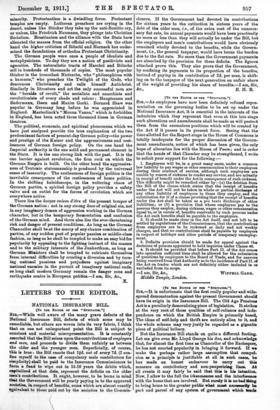LETTERS TO THE EDITOR.
NATIONAL INSURANCE BILL.
[To THE EDITOR OP TER " SPECTATOR."]
SIR,—While well aware of the many grave defects of the National Insurance Bill, defects of which some may be remediable, but others are woven into its very fabric, I think that on one not unimportant point the Bill is subject to constant and material misrepresentation. It is constantly asserted that the Bill seizes upon the contributions of employers and men, and proceeds to divide them unfairly as between the older and the younger men. Superficially, of course, this is true : the Bill enacts that lid. out of every 7d. (I con- fine myself to the case of compulsory male contributors for simplicity) shall be paid to the Insurance Commissioners to form a fund to wipe out in 15-16 years the debits which, capitalized at that date, represent the deficits on the older men's contributions. It ought, however, to be borne in mind that the Government will be yearly paying in to the approved societies, in respect of benefits, sums which are almost exactly egnivalent to those paid out by the societies to the Commis- sioners. If the Government had devoted its contributions for sixteen years to the extinction in sixteen years of the debt of the older men, i.e., of the extra cost of the unneces- sary fiat rate, its annual payments would have been practically no more or less than they will actually be under the Bill, but the employers and men's contributions would have obviously remained wholly devoted to the benefits, while the Govern- ment, i.e., the general taxpayer, would have borne the burden due to the flat rate. No more than the Government payments are absorbed by the provision for these deficits. The figures attached prove this. They also prove that the Government, by confining its payments to its proportion of the benefits, instead of paying in its contribution of 2d. per man, is shift- ing on to the taxpayer of the next generation an unfair share of the weight of providing his share of benefits.—I am, Sir, E. H. B.


































































 Previous page
Previous page